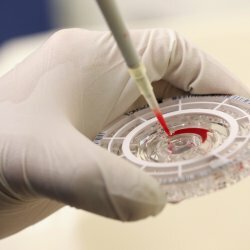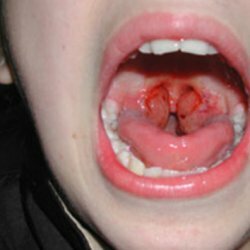Inflammation of the large intestine

The large intestine is part of the digestive tract. In medicine, inflammation of the large intestine is called colitis. Inflammation of the intestine, otherwise colitis is a disease due to inflammatory-dystrophic changes in the colon. This disease of the large intestine is limited or spread over several segments. In most cases, the distal part of the large intestine is affected( this is proctitis), sigmoid and rectum( proctosigmoiditis).
Causes of inflammation of the large intestine
The most common cause of the disease is a bacterial infection. Inflammation of the intestine can trigger the penetration of pathogenic bacteria. Bacteria in the intestines can get with foods and drinks not the first freshness. In patients who have undergone intensive treatment with antibacterial drugs, Clostridium bacteria can cause infectious colitis.
Inflammation of the intestine can occur due to narrowing of the vessels( blood) of the large intestine. Inflammation of the intestine occurs due to deterioration of the blood supply to the walls of the vessels. This type of colitis is more common in the elderly. Rapid dehydration of the body can cause ischemic colitis in people with low blood pressure. The obstruction to the large intestine along the path of blood flow can arise due to abdominal cramps, with a hernia, may also be the cause of ischemic colitis. A person, along with a fever and diarrhea, to experience pain in the abdomen may be due to a lack of oxygen.
Ulcerative colitis is the most dangerous type of disease. His reasons for today have not yet been determined, because they are directly related to external stimuli. It is believed that this disease genetic inheritance, also more often they suffer people who in childhood were not breastfed. Ulcerative colitis can be manifested through ulcers in the mouth, bloody diarrhea, eye irritation, inflammation of the lower part of the spine, a feeling of incomplete bowel movement, etc.
Symptoms of inflammation of the large intestine
In this patient, the symptoms of different types of colitis vary, but more frequent following. This is a bloody stool, abdominal cramps, anemia, fatigue, diarrhea, soreness of the joints. Also, with inflammation of the large intestine: weight loss, loss of appetite, fever, dehydration, possible high temperature. The patient's stomach tightens.
Treatment of inflammation of the intestine
If a person has abdominal cramping pains, bloating, diarrhea with an admixture of mucus, an increase in body temperature of 38-39 degrees, you need to call an ambulance urgently. At the expressed exacerbation of an intestine prescribe antibacterial treatment, a famine within 2 days, then a dietary food.
Also after discharge from the hospital it is necessary to carry out preventive treatment with medicinal anti-inflammatory herbs. Prepare the phytospora. You need to take the grass of a thousand-centner, the leaves of sage, the flowers of chamomile( all in a teaspoonful).Pour boiling water( glass) and insist in the thermos for about an hour. Take an empty stomach on a tablespoon every two hours for 2 weeks. After dose increase to 50 ml and take every 5 hours. The full course of preventive treatment is 1 month.
Effectively helps with inflammation of the intestine infusion of a blood-groove. It is necessary to mix the crushed roots and rhizomes of the blood-groove medicinal. Spoon a tablespoon of chopped blood bitter with a glass of boiling water and cook on low heat for half an hour. After a couple of hours, take before meals 5 times a day for 1 tablespoon.
In chronic form of inflammation of the intestine, the following collection helps a lot. Take the rhizome of the cinquefoil erect( 25 g.), Fruits and leaves of blueberries( 20 grams each), inflorescences of chamomile( 55 g.).All grind and a teaspoon of the mass pour cold water( 250 ml), leave to infuse for 6 hours. After a low heat, boil 7 minutes, strain and drink the broth in small sips throughout the day.



